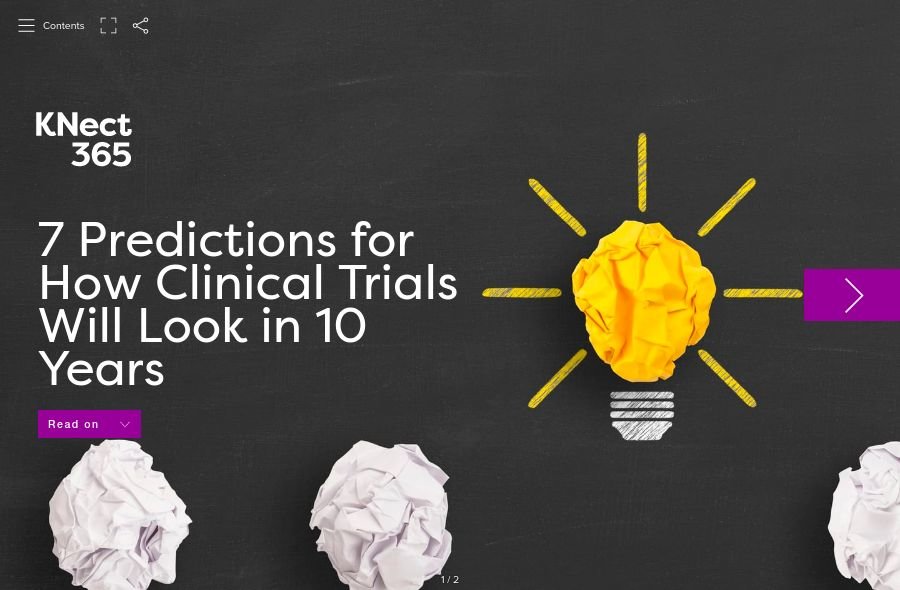7 predictions for how clinical trials will look in 10 years

The way clinical trials are being run is gradually changing with the implementation of new technologies. AI, wearables, virtual and in silico trials, digital biomarkers and personalized medicine are all likely to play a major role in the future of clinical trials.
Here seven clinical experts representing pharma, CROs, patient groups, academia and health futurism make their predictions for how clinical trials will look in 10 years time. Read below or click through to our new interactive feature:
Amanda Goltz, Vice President, Digital at Biocompatibles, a BTG International group company
In my view, one of the most interesting capabilities technology applied to clinical trials will bring us is the opportunity to have more inclusive, representative clinical trials. Some of the emerging solutions poised to transform how we do test therapeutics include remote trials (participants record clinical data like vital signs and symptoms through passive sensing technologies at home), virtual trials (running a real-time trial with an intervention group compared to a “virtual’ control comprising a dataset mined from electronic health records), and expanding our definition of efficacy and lowered disease burden to include such “real world” markers as functional status, return to work, and achievement of patient-defined treatment goals.
Many emerging companies are providing these technologies as a service, displacing traditional CROs – and pharma and med tech have ready access to these capabilities. One must question the moral and ethical question of insisting on a traditional ten-year RCT when you could understand a drug’s impact on a representative population, in the real world, so much sooner that you can get it to people who would benefit. For example, in the US, African-Americans are a group disproportionately affected by hypertension, but are under-represented in clinical trials. Virtual trials would help us ensure that the study population reflects the real population. We could close the efficacy-effectiveness gap, where we know drugs perform differently in trial from in real world practice, and we could model out different treatment pathways in the trial environment to assist physicians in ordering.
Finally, we talk a lot about the promise of precision medicine, but I think we haven’t fully capitalized on personalized medicine – how treatment regimens should be tweaked to meet not just the disease but the patient’s biopsychosocial circumstances, needs, and their own goals for treatments (not the drug companies’ or the doctors’ goals). These technologies could help us learn more about what patients want from their treatments - what kinds of benefit/side effects tradeoffs they are willing to make, how they approach the management of their condition – which will help us not only develop new therapies and market existing ones more effectively, but enable what should be our highest goal: helping people live the healthiest lives possible.
These views are Goltz's own and not necessarily representative of BTG
Amanda Goltz is speaking on a panel titled The Future of Clinical Trials - New partnerships, new innovations and new processes at Partnerships in Clinical Trials Europe on 27 November.
Judith Kornfeld, Chief Business & Operations Officer, Oregon Health & Sciences University
Digital biomarkers will play a big role and replace much of the testing and biomarkers we currently use. The parameters will be adjusted to detect change in everyday life activities and outcomes will be tied to improved objective measures that are reflected in activities of daily living.
Judith Kornfield is presenting a case study on Digital Biomarkers – The Use of Digital Technology to Empower Clinical Trials Data at Partnerships in Clinical Trials Europe on 28 November.
Dr. Raphaela Schnurbus, Clinical Solutions Director, OPIS
It is clear that patient-centric trial design is here to stay. The FDA has already released several draft guidance documents to favor a patient-centric approach.
When it comes to designing processes for modern trial execution, Artificial Intelligence has the potential to streamline these processes, from matching eligible patients to studies, to medication adherence and data collection. Again, the FDA is definitely helping with guidance that lays the groundwork for advancements in digital health.
Virtual trials and decentralized trials are already a reality in the US. Pragmatic trials, basket trials and umbrella trials are the future. With precision and personalized medicine, patient selection for trials have become very specialized. As a result, “wasting” patients on control groups in trials will have to be replaced by smarter options such as randomizing against real world patient data.
In 10 years? Who knows…would the gold standard randomized controlled trials and the enormous multi-country phase III trials still exist as we know them today? I guess it depends on how smartly we start to use the enormous quantity of data we are generating and how preciously we view patient contribution in medical research.
Dr. Bertalan Meskó, The Medical Futurist
What if it is time to use disruptive innovations to change how clinical trials are performed? Imagine the following: neither animals, nor humans are the subject of the lengthy and costly drug creation process, but their characteristics are so perfectly simulated that the clinical trial can be carried out in less time, with less money and still amazing results. This method is called an in silico trial.
An in silico clinical trial is an individualized computer simulation used in the development or regulatory evaluation of a medicinal product, device, or intervention. While completely simulated clinical trials are not feasible with current technology and understanding of biology, its development would be expected to have major benefits over current in vivo clinical trials, and research on it is being pursued.
Imagine if we could test thousands of new potential drugs on billions of virtual patient models in minutes? What would it take to achieve such a capability? At the very least, the virtual patients must almost perfectly mimic the physiology of the target patients, with all of the variation that actual patients show. The model should encompass circulatory, neural, endocrine, and metabolic systems, and each of these must demonstrate valid mechanism–based responses to physiological and pharmacological stimuli. Probably cognitive computers would be needed to deal with the gargantuan amount of resulting data.
Melissa Menke, Founder and CEO, Access Afya
The trial landscape will be more about following small populations real time using wearables and sensors in off-site locations. The purpose of this will be to produce data for government agencies and ministries to show the cost/benefit of such interventions versus current medical practice and system costs.
Melissa Menke is speaking on a panel titled Wearables and sensors - Innovative ways to collect clinical data- what does it mean for patients and clinical trials? at Partnerships in Clinical Trials Europe on 28 November.
Michelle Petersen, founder of Healthinnovations
In regards to realtime data collection of whole body systems, technology-wise, we’re about to step it up a gear - synthetic biology, or synbio, IS changing EVERYTHING, not just clinical trials. Synthetic biology involves the fabrication of previously non-existent biological components and systems, in some cases the biological component can assemble itself, with the artificial cell mimicking a naturally occurring biological cell. The construction of artificial cells focuses on building ‘minimal’ cells by reducing or simplifying the genetic network of a living cell, producing a theoretical cell with the minimum number of genes needed to survive and to fulfil the desired programmed function.
For instance researchers have engineered artificial cells which can sense, react and interact with bacteria, as well as function as systems that both detect and kill bacteria with little dependence on their environment. In theory artificial biological systems can be bioengineered to fulfil any desired function, including the type of entities being trialled and the monitoring of the whole human system in real-time. In fact these systems will be so single-cell sensitive, potentially they could be used to monitor the effect and offset of a biological drug or NCE on every genetic system in the body, and the information provided plugged into AI-based algorithms in future in silico drug design systems.
Great strides are currently being made towards this end with much research concentrated on the synthetic microbiome that can record information about the state of the gut in real-time, and report the presence of disease or suspicious activity. Currently, researchers have engineered a genetic signal-transmission system in which a molecular signal sent by bacteria in response to an environmental cue can be received and recorded by a different species of bacteria, namely E. coli, in the gut of a mouse. In theory this may work for artificial bacteria which can also interact with the environment to report on any adverse events and correct them. For the future, the researchers are working towards a synthetic microbiome with engineered bacteria species in the human gut, each of which has a specialized function, such as detecting and curing disease, creating beneficial molecules, improving digestion, and communication between engineered bacterial species to ensure that they are all balanced for optimal human health.
However, until we reach optimal status for the synthetic microbiome and other synbio, nanopores will be the next gen wearable used in trials in the next 10 years. Nanopores produce an ionic current and can accurately measure specific molecules in a nanolitre of human fluid continuously with no sample preparation. Whilst they do not currently possess the scope or sensitivity of synbio, it is predicted that incorporation of nanopore-based technology into portable electronic devices will allow the development of sensitive, continuous, and non-invasive sensors for metabolites in point-of-care and home diagnostics. With researchers planning to develop a nanopore system with proteins which are specific to hundreds of different metabolites, these next gen wearables will be easily connected to the patient’s electronic-based comfort zone via lab tags providing them with a wealth of health data and information.
Patricia Devitt Risse, PharmD, President, Precision for Medicine, Oncology and Rare Disease
Clinical trials will be personalized approaches, with individualized and data-driven precision products to more accurately direct therapy based on unique, patient-centric molecular profiles. Real-world data and telemedicine will be leveraged to identify and communicate with targeted patients with unique mutations or diagnoses to help facilitate engagement and enrollment, with improved freedoms for participation with enhanced technology applications.
Robust biomarker platforms will drive patient selection to help optimize therapeutic impact and overall patient benefit. Monitoring of clinical data will largely be remote with limited need for on-site visits and inspections because of the electronic source record anonymous data transfer to the clinical database. Products with unique targets that can provide larger benefit to fewer patients will outnumber “me too” approaches.
The regulatory agencies will remain focused on leveraging technology and translational data to support shorter development timelines and approvals, to speed delivery of benefit to patients in need, and to improve overall efficiencies and cost control of conducting trials.
Four streams are dedicated to new technologies at Partnerships in Clinical Trials Europe in Barcelona on 27 - 29 November 2018. Explore the full agenda or register for a pass.
